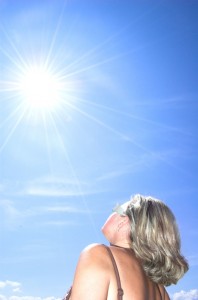Protecting our eyes in the winter is essential for preventing short and long term problems.
Eye dryness is very common, especially on cold brisk days. Finding comfort near a warm toasty heater or fireplace can dry the eye surface too. Maintain good eyelid hygiene, stay hydrated and use artificial tears to control mild dry eye symptoms.
 Sunglasses are important for preventing keratitis (a burn on the cornea surface) and aging effects such as cataracts, pinguecula and macular degeneration. Snow-blindness or keratitis is a painful corneal condition that can occur when the outermost layers of the cornea are damaged (like a sunburn). Damage can occur in as little as an hour of exposure to ultraviolet radiation, the risk is intensified at higher altitude.
Sunglasses are important for preventing keratitis (a burn on the cornea surface) and aging effects such as cataracts, pinguecula and macular degeneration. Snow-blindness or keratitis is a painful corneal condition that can occur when the outermost layers of the cornea are damaged (like a sunburn). Damage can occur in as little as an hour of exposure to ultraviolet radiation, the risk is intensified at higher altitude.
Damage to the eye doesn’t stop on the surface. Cumulative ultraviolet exposure damages the lens of the eye causing cataract formation. Research has also found that UV radiation contributes to macular degeneration.
Wearing good UV blocking sunglasses protects all layers of the eye. The UV radiation reflected off of water and snow is dangerous too.
is dangerous too.
Don’t hang-up your sunglasses because it is winter, year-round UV protection is a proactive way to promote good eye health and clear vision for adults and children.
